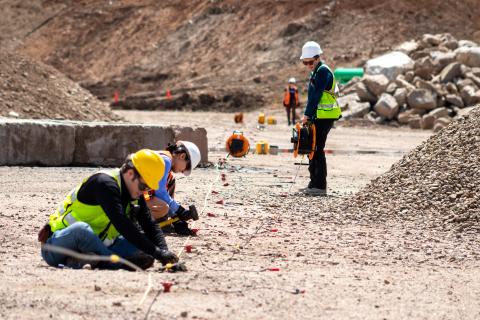All Categories
Featured
Table of Contents
Airborne Geophysical Survey in East Fremantle Western Australia 2020
This work is significantly contracted out, so consultancies provide another source of work. Consultancy companies differ in size, from really little business to big multinationals. Some consultancies are quite specialised in using specific geophysical methods or operating in specific locations, while others use a more diverse variety of services to their consumers.
The extraction of gas from garbage dump websites is another area of employment and this might grow in the future. Expedition business may undertake work for construction firms, water companies, mining companies and ecological agencies, so geophysicists might be employed in any of these settings. Other employers include: geological surveysgovernment bodies and agenciesuniversities and research institutes.


Jobs may be listed in the oil and gas sector press. Recruitment is affected by oil cost changes and the level of competition for positions varies depending upon this. Professions Days, which cover the complete series of geoscience professions and are normally attended by a number of essential industry companies, are run by The Geological Society.
Geophysics Jobs in Bibra Lake WA 2023
A few of the large oil and gas business provide a complete two-year structured training programme throughout the breadth of geophysics, including the opportunity to experience operate in numerous groups prior to specialising in one location. Your training might include deal with: existing wellsmagnetic and gravitational prospective field information analysisresearchrock analysis. It's more usual for your preliminary training to be provided on the job.

There may be a probationary period during which you work along with an experienced colleague. Competency-based appraisals take place routinely in many firms. In smaller companies, and for academic posts, there is unlikely to be any official training - you'll be expected to start work straightaway and get skills as you go along.
If you work for a smaller business, you might discover that you require to take duty for arranging and funding your own development and training. If you have a geology degree, membership of The Geological Society can be helpful for networking and for maintaining to date with the industry.
Geophysicists in Subiaco Western Australia 2020
You might also discover it helpful to sign up with the PESGB (The Petroleum Exploration Society of Great Britain, which has a geophysics special interest group. After a probationary duration, and once you have actually gained some experience, you might advance to senior geophysicist, then group leader and after that into a senior role in management.
The ease of movement between roles depends upon the company structure. Study at Masters or Ph, D level in a subject related to geophysics or geosciences may aid with your career development and progression. The work market within the oil and gas market is very based on price and this might impact your chances for profession development.
However, not all jobs are dependent on the oil and gas markets. For knowledgeable geophysicists, freelance consultancy offers an excellent path for career development. You can likewise specialise in a specific location of geophysics. As a geophysicist, you're most likely to have numerous jobs throughout your working life. Global mobility is important for dealing with peaks and troughs in various countries at various times.
Geophysical Prospecting in West Leederville Aus 2023
From geophysics, it's possible to concentrate on seismology (completing more training to end up being a seismic interpreter) or to move into related areas such as engineering geology or danger prediction.
Deciding what to study in college is a tough option. Even if you know that your field of interest lies in science, what program of study is right for you? If you make the choice to major in physical and biological sciences and pursue a career as a geophysicist, you're getting ready for an amazing and profitable profession.
But the primary step to accomplishing your goal of ending up being a geophysicist is earning a degree. Even for entry-level positions in the field of geoscience, you'll need a bachelor's degree (a geophysicist college degree) from a recognized college or university. Some research study positions require candidates to hold master's degrees or even Ph.
An Assessment Of Geophysical Survey Techniques ... in White Gum Valley WA 2023
Postgraduate degree are especially important if you plan to teach at a four-year institution. Geophysicists use physics principles and techniques to study the gravitational, magnetic, and electrical fields of the earth. This enhances researchers' understanding of both the world's interior core and its surface area. Geophysicists need to have the ability to: examine rocks, photographs, and other pieces of data perform research both in the field and in labs create maps and charts of their findings write reports To accomplish all this, students require a specialized education for geophysicist professions.
As stated above, you'll need a bachelor's degree in geoscience or a related discipline, such as a physical science or a life sciences, to land an entry-level job. However students can likewise prepare by majoring in subjects like: Biology Chemistry Computer system science Engineering Mathematics Physics The above geophysicist majors provide a more generalized approach to a single clinical discipline, but many programs require students to take several geology course.
Latest Posts
Where Can A Geophysicist Work Other Than The Oil Industry? in Ellenbrook Oz 2021
Geophysicist in Como Aus 2022
Geophysical Surveys Definition & Meaning In Stock ... in Karrinyup Aus 2022